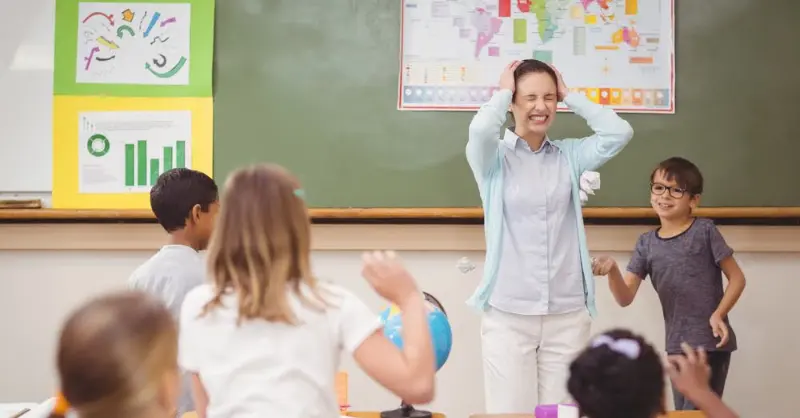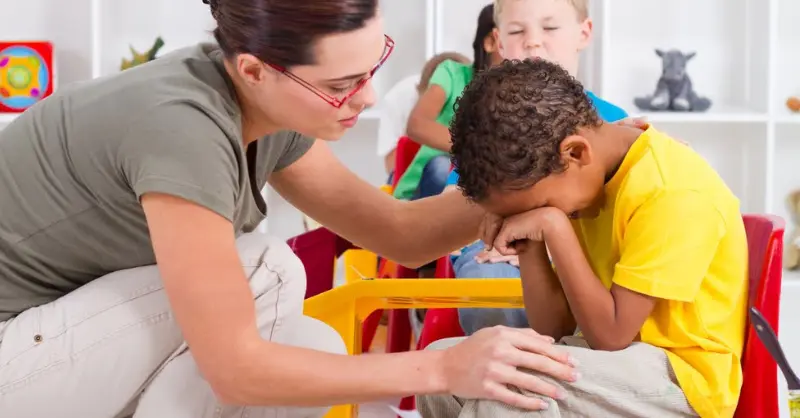Challenging behaviour in the classroom can be a major barrier to learning. In addition, it can disrupt the education of the student exhibiting the challenging behaviour and the other students in the class. Therefore, teachers must be prepared to address challenging behaviour respectfully, fairly, and effectively.
What is challenging behaviour in the classroom?
Challenging behaviour in the classroom can refer to any behaviour that is disruptive to the learning environment or difficult for the teacher to manage. Examples of challenging behaviour in the classroom may include:
♦ Disrupting the class or interrupting the teacher
♦ Refusing to follow the rules or complete tasks
♦ Being physically or verbally aggressive towards other students or the teacher
♦ Being defiant or non-compliant
♦ Having difficulty paying attention or staying on task
Challenging behaviour can signify a student struggling with something, such as a learning difficulty or emotional issue. Hence, teachers need to understand the underlying causes of challenging behaviour and work with the student and, if necessary, with parents and other school staff to find ways to support the student and address the behaviour. To develop skills and expertise in classroom management can also take Classroom Behaviour Management Course.
What are the types of challenging behaviour in the classroom?
There are many different types of challenging behaviour in the classroom. A student’s specific behaviours may vary depending on age, developmental level, individual needs and circumstances, and other factors. Some common types of challenging behaviour that may occur in the classroom include:
Disruptive behaviour
Disruptive behaviour includes
• Talking out of turn,
• Interrupting the teacher or other students,
• Engaging in activities that distract from the lesson.
Defiant behaviour
Defiant behaviour includes refusing to follow the rules or directions, challenging authority, or being non-compliant.
Aggressive behaviour
Aggressive behaviour includes physical aggression, such as hitting, kicking, or pushing, or verbal aggression, such as shouting or threatening.
Inattentive behaviour
Inattentive behaviour includes difficulty paying attention, following instructions, or staying on task.
Hyperactive behaviour
Hyperactive behaviour includes excessive talking, fidgeting, or difficulty sitting still.
Thus, teachers must be aware of the specific types of challenging behaviour a student is exhibiting and tailor their approach to addressing the behaviour accordingly.
The Classroom Behaviour Management Course – Level 3 would be ideal for people
• looking to develop their skills and expertise in classroom management,
• Currently working in education or looking to enter the field.
• Besides, It would also be helpful for people aspiring for new jobs or promotions at their existing jobs, such as teachers or classroom assistants.
• Additionally, the course could be helpful for anyone looking to learn a new skill or acquire some knowledge about classroom behaviour management.
Most importantly, this module would likely cover
• Importance of understanding behaviour and building positive relationships as a teaching assistant.
• It may also discuss identifying and addressing different types of challenging behaviour.
• Effective communication in the classroom may provide strategies for building strong relationships with students.
• Delve deeper into specific communication skills and strategies for interacting with students in a way that promotes learning and positive behaviour.
• How social, emotional, and mental health issues can affect behaviour in the classroom and how to support students who may be struggling in these areas.
• Focus on creating a positive and supportive learning environment for all students and may cover topics such as classroom management, classroom layout, and creating a positive culture.
Finally, the mock exam and final exam would likely test the knowledge and skills covered in the previous modules.
What are the stages of challenging behaviour?
Several stages can be helpful to consider when thinking about challenging behaviour. These stages include
The antecedent
The antecedent is the event or situation that occurs before the challenging behaviour. Antecedents may include certain triggers or prompts that can lead to challenging behaviour.
The behaviour
The behaviour is the challenging behaviour itself, such as talking out of turn or refusing to follow the rules.
The consequence
The consequence is the result of the challenging behaviour, such as the teacher redirecting the student or providing a consequence for the behaviour.
The function
The function refers to the purpose or reason behind the challenging behaviour. Understanding the function of the behaviour can help teachers identify underlying causes and develop strategies to address the behaviour.
Therefore, by considering these stages, teachers can better understand the context and dynamics surrounding classroom behaviour management and develop a more targeted and effective approach to addressing it.
Some examples of challenging behaviour in the classroom?

Some examples of challenging behaviours in the classroom setting:
• Disruptive behaviour, such as talking out of turn or not following classroom rules
• Inattention or lack of focus on tasks
• Refusal to complete work or participate in activities
• Difficulty with social interactions, such as bullying or exclusion of others
• Physical aggression or destructive behaviour
• Extreme emotional reactions, such as crying or anger outbursts
• Difficulty following instructions or completing tasks
• Noncompliance with requests or rules
• Defiance of authority figures
• Impulsivity or difficulty waiting their turn
Consequently, these behaviours can have a range of underlying causes depending on the student and context.
What are the effects of challenging behaviour in the classroom?

Challenging behaviour in the classroom can have various negative effects, both for the student exhibiting the behaviour and for the other students in the class. Some of the effects of challenging behaviour in the classroom may include:
• Distraction and disruption of the learning environment for other students
• Increased stress or anxiety for the student exhibiting the behaviour and for their classmates
• Academic progress for the student exhibiting the behaviour and for their classmates decreases
• Decreased engagement and enjoyment of the learning experience for all students
• Teacher satisfaction and morale decrease
• Negative impacts on the classroom climate and overall culture of the school
With this in mind, it’s important to address challenging behaviour in the classroom as early as possible to minimize these negative effects and create a positive and supportive learning environment for students.
10 Strategies to deal with challenging behaviour in the classroom

There is a range of strategies that teachers can use to handle challenging behaviour in the classroom. However, it’s important to remember that no one-size-fits-all approach will work for all students. Instead, try different or a combination of strategies to find an effective solution. Some strategies for handling challenging behaviour in the classroom may include:
1. Establish a class code of conduct
Creating a clear set of expectations for behaviour in the classroom can help students understand what is expected of them and make it easier for them to follow those expectations.
2. Turn negatives into positives.
This strategy involves positively reframing negative behaviour to encourage more positive behaviour. For example, instead of saying, “Don’t run in the hallway,” you might say, “Please walk in the hallway.”
3. Recognize good behaviour and achievements
Positive reinforcement, such as praising students for exhibiting good behaviour or acknowledging their achievements, can help encourage more positive behaviour.
4. Turn positive behaviour into a lesson.
Using positive behaviour as a teaching opportunity can help reinforce the behaviour and encourage students to continue exhibiting it.
5. Communicate well
Clearly and consistently communicating with students about their behaviour can help them understand the consequences of their actions and encourage more positive behaviour.
6. Communicate with parents
Keeping parents informed about their child’s behaviour and working with them to develop strategies for addressing challenging behaviour can effectively support students in the classroom.
7. Create a calm space
Designating a calm and quiet space in the classroom where students can go to de-stress and regain control of their emotions can be an effective way to prevent challenging behaviour from escalating.
8. Keep class disruptions minimal.
Minimizing disruptions in the classroom, such as unnecessary noise or movement, can help create a more focused and productive learning environment.
9. Only punish students when necessary.
It’s important to use punishment sparingly and only when necessary, as punishment alone may not effectively address the underlying causes of challenging behaviour.
10. Don’t practice public consequences.
It can be more effective to handle consequences for challenging behaviour privately rather than in front of the whole class. This can help preserve the student’s dignity and may be more effective at addressing the behaviour.
It’s important to approach challenging behaviour calmly and patiently and try to understand the underlying cause of the behaviour to find the most effective solution.
Communication skills to deal with challenging behaviour in the classroom
Effective communication is an important skill for teachers when dealing with challenging behaviour in the classroom. Some strategies for improving communication when dealing with challenging behaviour include being clear and consistent, using non-verbal cues, using positive language, staying calm and composed, listening actively, providing feedback and support, and seeking outside help if necessary.
General strategies to improve behaviour in the classroom
There is a range of strategies that teachers can use to improve behaviour in the classroom. Some strategies include establishing clear rules and expectations, providing positive reinforcement, using redirection, providing additional support, implementing a behaviour management plan, and building positive relationships with students.
Challenging behaviour influences and triggers
Some many possible influences and triggers can contribute to challenging behaviour in the classroom. Some potential influences and triggers may include:
• Underlying medical or mental health conditions, such as attention deficit hyperactivity disorder (ADHD), learning disabilities, or anxiety disorders
• Developmental delays or disabilities
• Trauma or adverse life experiences, such as abuse or neglect
• Poor social skills or difficulty with social interactions
• Difficulty with language or communication
• Lack of understanding or difficulty with the material taught
• Sensory processing issues, such as sensitivity to certain sights, sounds, or textures
• Physical needs, such as lack of sleep, hunger, or other basic needs
• Stress or other negative emotions, such as anger, fear, or frustration
• Lack of structure or clear expectations
• Changes in routine or environment
It’s important to consider the individual student and the context in which the behaviour occurs to understand the specific influences and triggers contributing to challenging behaviour.







 April 26, 2024
April 26, 2024






